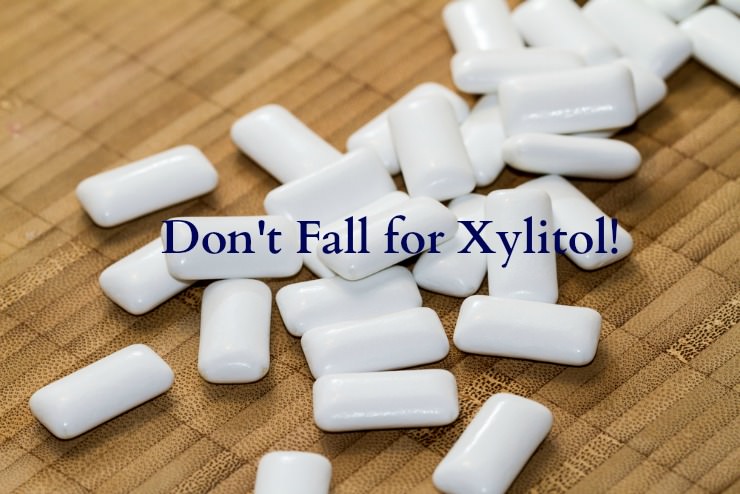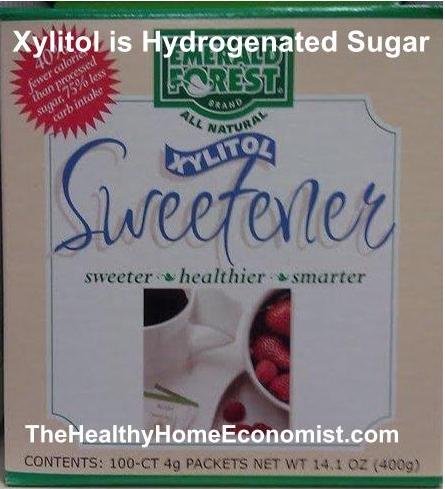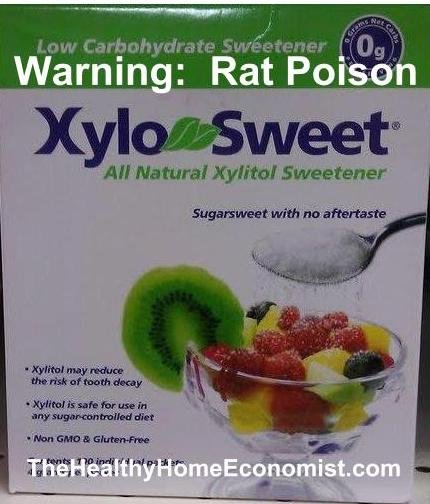
Xylitol is truly the darling of sugar substitutes today. The American Dietetic Association touts its use, with this sugar alcohol sold alone and as a sweetener in a variety of processed foods. Health benefits include a reduced glycemic response compared with sucrose, increased absorption of B vitamins and calcium, and even a reduction in dental caries risk.
Consequently, people with blood sugar issues are flocking to processed foods containing this alternative sweetener as a way to satisfy that sweet tooth without the downside of exacerbating the risk factors for Metabolic Syndrome. This condition is known for the markedly increased likelihood of developing heart disease, stroke, and type 2 diabetes.
Even the healthfood community almost universally considers this sugar alcohol to be a healthy substitute for sugar. A primary reason is that it doesn’t directly contribute toward the growth of intestinal yeasts aka Candida.
Have you noticed that the check out aisles at health food stores are typically loaded with chocolates and other sweets containing at least some xylitol? The truth is that I have yet to talk with any health-conscious person who suggests to me any downside other than the potential for intestinal cramps if you get too much.
Xylitol is Naturally Found in Nature
Xylitol is, after all, a naturally occurring substance. Manufacturers of xylitol market it as derived from xylan. The fibers of many plants contain it, including berries, oats, beets, sugar cane and birch. Sounds pretty harmless at first glance.
The FDA has even granted xylitol GRAS (Generally Recognized As Safe) status. You can’t get any safer than that, right?
 Manufacturing Process
Manufacturing Process
It is true that xylitol is a naturally occurring substance. However, manufactured xylitol is another matter entirely. Food manufacturers produce it using the industrialized process of sugar hydrogenation. In order to hydrogenate anything, a catalyst is needed. In this case, Raney nickel is used which is a powdered nickel-aluminum alloy. (1, 2)
This poses the risk of heavy metal residue and contamination. Nickel, by the way, is a recognized carcinogen and aluminum is associated with the development of dementia. Heavy metals in the body are notoriously difficult to eliminate with frequent use of infrared sauna probably a good idea.
This alternative sweetener doesn’t seem quite so warm and fuzzy anymore, does it?
There is currently no literature on any detrimental health effects of consuming hydrogenated sugar. However, food manufacturers widely used hydrogenated fats for decades before the very damaging effects of cardiovascular health became widely known!
Given the violent industrialized process that is required to produce a hydrogenated sugar like xylitol, it would seem wise to avoid it based on the very poor track record of hydrogenated foods in general.
Most Xylitol Sourced from GMO Corn
While it is true that xylitol can be derived from the xylan of birch trees, xylan is also found in corn cobs. It is much cheaper to use corn instead of birch bark to derive xylitol and so what do you think manufacturers prefer? Corn, of course.
Therefore, unless the label of a xylitol-containing product specifically notes that it is from birch or another nonGMO source, xylitol is very likely from genetically modified corn or possibly GMO sugar beets.
This is the same problem as high fructose corn syrup (HFCS) and white sugar from beets. Food manufacturers rely heavily on these sweeteners in the production of sodas and sports drinks.
You get a dose of GMOs with every sip! More on GMO dangers including sterility and stomach holes at the provided link.
Usage Contributes to Gut Imbalance
The digestive process does not break down sugar alcohols like food. Rather, xylitol arrives intact into the intestines.
At that point, a process called “passive diffusion” takes place. This means that the xylitol draws water into the bowels. Only a partial breakdown is the end result. The unmetabolized portion ferments providing the perfect environment for undesirable bacteria to thrive and grow.
It is true that xylitol itself does not feed candida directly as sugar does. As a result, this artificial sweetener is even promoted as a useful part of the Candida Diet. Unfortunately, the fermentation of undigested xylitol in the gut most definitely can exacerbate yeast problems. Don’t be fooled by this argument!
This is exactly why consuming xylitol can make some folks so gassy and even trigger cramping and diarrhea. Gut pathogens having a heyday in your intestines give off a lot of smelly toxins!
Other Little Known Problems
Xylitol can contribute to acid reflux problems. As a result, those who have issues in this area should avoid it for that reason alone. Chronic acid reflux is a serious problem that can lead to cancer of the esophagus and larynx.
In addition, those who suffer from seizures of any kind should stay away from this alternative sweetener as it can increase the frequency of epileptic attacks.
Two Pieces of Xylitol Gum Can Kill a Rat?
According to unpublished lab tests, approximately 1.65 grams of xylitol kills a 100-gram rat half the time.
Two little pieces of xylitol gum contain about .7 – 1 gram. This is probably enough to meet the definition of rat poison.

Cavity Prevention
Many people are chewing xylitol gum due to compelling scientific evidence for cavity prevention. What about children, however?
Rami Nagel, author of Cure Tooth Decay, doesn’t even recommend xylitol gum for this purpose. His research for any long term safety data turned up the following:
- Epidemiology: No information found
- Teratogenicity: No information found
- Reproductive Effects: No information found
- Mutagenicity: No information found
- Neurotoxicity: No information found
In summary, using this modern substance officially renders you a guinea pig, my friend! It seems that any benefits of cavity prevention are outweighed by the fact that there is no actual safety data backing up its use.
Safe Uses of Xylitol
Given all the problems that consumption of xylitol can trigger, it seems best to bypass the use of this sugar substitute on a regular basis.
Can it ever be helpful? Does it have any benefits whatsoever?
Potentially so. The only time I personally would ever consider using xylitol is to help resolve a childhood ear or sinus infection in order to prevent the use of drug-based antibiotics.
There is evidence that this popular sugar alcohol can indeed help encourage a healthy balance of beneficial bacteria found in the ear canal and sinus cavities. Products like this incorporate xylitol for this purpose.
A therapeutic dose can help resolve infection in these areas quickly with no medication required.
Thus, if you choose to use it, make sure it is sparingly and therapeutically (not as food). Also, make sure it does not come from a GMO source like corn!
References
(1) Xylitol production via catalytic hydrogenation of sugarcane
(2) Catalytic hydrogenation of xylose to xylitol using ruthenium catalyst on NiO modified TiO2 support
(3) Cure Tooth Decay by Rami Nagel
(4) Sugar-Free Blues: Everything You Wanted to Know about Artificial Sweeteners
More Information
Yacon: Healthy Syrup or Healthfood Hype?
Jaggery: India’s Sweet Gift








Following
Josh Johnson,
I put it in my homemade toothpaste . I found a brand made from white birch. Do you find that safe, I do not eat it? But it all absorbs?
My dentist wants me to use oral hygiene products with Xylitol to keep my teeth and mouth clean and in place of sugar and chewing gum. He also said Xylitol would kill all strep bacteria in the mouth, throat and nasal areas. I’m looking at the pile of unopened stuff he gave me as I type this.
No, don’t worry about what she wrote. I had a search bring me to this page, and her arguments are poor. For example, feeds gut bacteria… uh, like a prebiotic… we have healthy gut bacteria, you know.
Feeds *pathogenic* gut bacteria, not beneficial probiotics. There are different kinds of but bacteria …. good AND bad.
Sarah? Are you making stuff up? Or, were you the first to discover this factor? Xylitol feeds that bad bacteria in the gut? You mean its just as bad as sugar in the gut, but not in the mouth? What research can you cite, please?
I tried xylitol when I had gestational diabetes and it really bothered my gut plus gave me a headache. Stevia was a much better choice for me.
I couldn’t figure why my calf had been hurting, about a week or so after taking xylitol, maybe two or three spoonfuls daily. Even after one day free, it has stopped. Maybe?
I had a spasm in my calf like I had never experienced in my life, Going back to sugar, 1/2 what I used before, only use it in coffee.
Shannon Stark
It’s also LETHAL to pets. My parents dog almost died after eating bread made with xylitol. Thankfully the vet knew her stuff and told my parents to give their dog canned pumpkin. It worked!
Good advice based on my experience.
I do use the Xylo-Sweet that you show above, which does say that it is non-GMO … thank goodness! I know you feel that it is poison also, but it would be better to use one in your article that was more of what you are saying. Many things overdone are not healthy … I will look into it more.
youre an idiot and this website is a joke. do you even know what the definition of a catalyst is? stick to baking cookies and doing laundry. thanks.